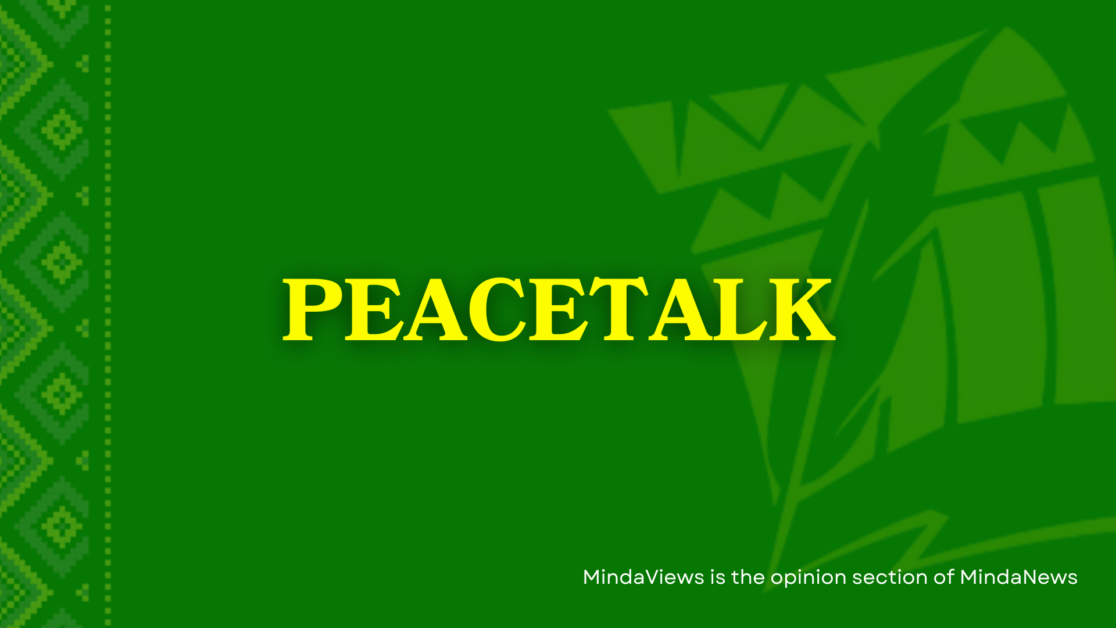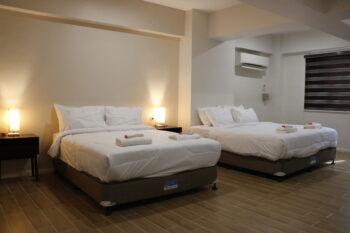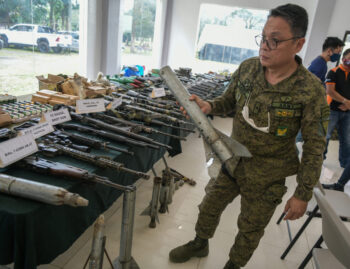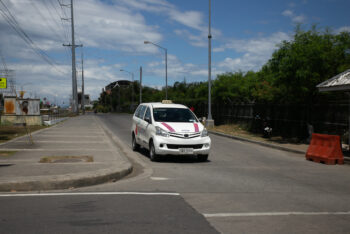
(Author’s note: Allow me to introduce myself as a student of History and advocate of the Moro people’s right to self-determination. In early March, before the advent of Ramadan, I was privileged to be invited and travel to a Bangsamoro territory and interview a number of key BTA and MNLF leaders and their followers and observe the conduct of Islamic community way of life. My role was to cover a Kiparat—a Taosug program of reconciliation involving conflicting MNLF factions. As development advocate I am aware every well-meaning Filipino wants peace so elusive in Mindanao. For this, I could not avoid observing and analyzing the local Moro situation outlined against the bigger picture of their historic struggle. In my younger years, I had been oriented to the Five Pillars of Islam and, for some time, used the pasbi prayer beads, which I found to be a calming meditative experience. The following narrative is my humble but honest interpretation of what is the worst that could happen and the best that could be achieved by the Bangsamoro under the banner of BARMM).
The Moro struggle for self-determination levels up with the formation of the Bangsamoro Transition Authority (BTA), serving both legislative and executive functions of the Bangsamoro Autonomous Region in Muslim Mindanao (BARMM). As its name suggests the reason for its existence is transitional, that is to ensure orderliness of procedure as the local autonomy is put in place and established.
Legitimately invited, selected, appointed, and popularly received as they are, members of the BTA, to this author’s opinion, are being called to make the best out of a bad bargain. Who calls them to do so and why?
Six generations of Moro, enduring marginalization and discrimination, fighting a war against oppression, valid and undeniable, wasteful and bloody, is the BARMM’s background reality.
All the Philippine presidents since Ferdinand E. Marcos, Sr., learned the hard way to recognize that the Moro is a people with legitimate right to self-determination. For all the government’s hesitation to give back what rightfully belongs to them, the Moro had paid too much for little gain that this writer wonders what best achievement means under the present BARMM context.
My curiosity turns into amazement after conversing with an MNLF fighter who apparently retained his jolly, childlike predisposition despite having been inflected with six battle scars.
“A Muslim is a man of peace. A mujahideen (Muslim freedom fighter) engages in Jihad (Holy War) as the Quran teaches, only to fight oppression and injustice without hating his enemy,” Ustadz Murshi Ibrahim, Secretary General of the Central Committee of the revolutionary Moro National Liberation Front (MNLF) declares in answer to my amazement. Resilience, faith, obedience, now, valor incomparable is added to my list of many ways the Muslim spirit endured oppressive conditions.
On the other hand, the government does not run out of justifications and excuses to shortchange the Moro. Morally and legally speaking, what you possess that does not belong to you must be returned to the rightful owner. To this, the government’s attitude has been one of endless hesitation to return self-determination to the Moro in his homeland.
“That is why we preferred to negotiate peace with (AFP) generals than with (government) administrative negotiators, because the former understand (the horrors of) war and quick to respond (positively), whereas the latter did not go straight to the point but in circles.” Member of Parliament Atty. Randolph “Bong” Parcasio said.
Historically, the Moro people already have developed governance systems since pre-Hispanic times, about five hundred years before the First Philippine Republic was declared. Spain and America both failed to colonize the Moro people. Does the Republic of the Philippines have the moral ascendancy to grant autonomy to an older self-governing people that by twist of fate is included within the former’s territory? If the Philippine government has not been so beset with accusations of corruption, my answer would be yes, maybe.
Meanwhile, modernity, brought by the Americans, creeps in bringing about indispensable societal changes. BTA Deputy Speaker Ustadz Abdul Karim Misuari points out that the use of English as medium of instruction of the educational system virtually aborted (the development of) local dialects, thus, even the definition for things native to the islands is now in foreign tongue. In connivance with high technology the English language colonized collective Filipino psychology with pseudo culture aberrant to the indigenous. (It is noteworthy that Arab missionaries did not discourage indigenous practices resulting to harmonious integration of native culture with those of Islam).
Not to mention the hundred thousand killed in battles and the displacement of a million lives, Deputy Speaker Misuari’s elaboration of deculturation by the West is the crux why the Moro struggle must shift methodology, The shift is being done through the enactment of the Bangsamoro Organic Law by the Republic of the Philippines, paving the way for the formation of the BARMM and the BTA. Well-deserved victories these are but long in coming. Nonetheless, Moro freedom fighters wept in prayer in gratitude to Allah for another opportunity towards lasting peace.
Communities are animating again under a climate of peace. Proof to that is the Kiparat I attended in witness of the reconciliation of conflicting MNLF factions.
But how do the MNLF peace advocates deal with the subliminal impact and degenerative effects of high technology and social media? My thoughts skipped over the waves of speeches delivered in native tongue during the program, after which, I noticed the BTA Deputy Speaker Misuari doing a sunnah just behind me. A sunnah is an optional prayer an individual Muslim may perform apart from the five obligatory prayers. Instantly I had a clue to the answer.
“High technology like the cellphone, and social media, are like a double-edge knife. One may use it either for good or bad,” An Islamic educator and IT professional clarified.
Realistically speaking though, it seems the bad guys are enjoying the upper hand, to say the least… drone bombers, sex robots, internet addiction, Artificial Intelligence and transhuman masterminds are proliferating. One’s imagination could not cope with what else high technology could bring.
Considering the degenerative matrix of hi-tech global society, how would the current crop of neo-revolutionaries ensure that the future generations of Moro sustain their forefathers’ gains for self-determination? Ustadz Murshi Ibrahim, or SG (Secretary General) as he is informally referred to, elucidates further. “By returning to Islam, the negative and evil shall be mitigated.”
True enough, the religious dedication of the BTA officials and MNLF leaders and cadres I conversed with, is exemplary. A non-believer with open mind could not miss the thought-provoking sight of a community of Muslims—men, women, their youth, and the elderly—respond to a call to prayer by taking leave of whatever mundane activities they were engaged in and quietly troop to the mosque to pray, five times a day.
What they pray for, as taught by the Prophet Muhammad, is awe-inspiring. No, they do not pray to win the lotto, or to be granted some petty desire. They pray for the benefit of all of humanity, the animals, the plants, the angels… all of creation. This is authentic religion!
But organizations including religious ones have another face, one that is ugly, disfigured by human frailty. It is common occurrence that a financial upswing shakes the moral foundation of leaders. They make ambition-driven divisive decisions that the rank and file members follow. Selfishness expresses as envy, greed for recognition, power, and money. Intrigue, conflict, factionalism, and corruption ensue. The guiltless and pure of intention and conduct had been victimized in the past. The same dynamics could become cyclical with all of the Moro as well as non-Moro peoples as victims. God forbid.
This narrative is not about remembering what went wrong with the previously implemented autonomy that according to a previous administration was a “failed experiment.” The parties involved knew the details better than this author. One day, the whole truth shall shine forth dispelling the dark lies peddled as truth through the mass media. The point to remember is past mistakes must not be repeated but, rather, corrected. Ineptness is not the way of peace and prosperity. It leads to a collapse.
The Bangsamoro is fortunate for having multi-dimensional Islam as religion. It possesses unadulterated spiritual philosophy, its scripture not doctored. Islamic fundamental principles and its integral practices are not empty rituals, but are revealed as consistent with the findings of modern sciences like astrophysics, sociology, behavioral psychology, and health and wellness. Islam is geared not just for personal salvation but also for collective liberation. The Ramadan abstinences, not only from food but mundane preoccupation as well, for example, is proven beneficial to physical, mental, and spiritual well-being.
Conversely, the very threat of a backslide to personal ambition and intrigues, and factionalism and greed for power and money, makes it easier to answer the question what could be best attained under the banner of BARMM. It is incorruptibility.
Of the myriad Islamic teachings, incorruptibility is embedded in the concept of Ismah. Varied may be its interpretations by diverse schools of Islamic thought, the common denominator among them is that there is in man a quality that is impeccable and incorruptible brought about by faith and obedience to God. Bangsamoro leaders at this crucial juncture of redirecting history from armed struggle to peace and development are well-advised to tap on the resource of incorruptibility that Ismah provides.
Development, and degradation too for that matter, in Bangsamoro society is a process that normally commences from the top going down, from leaders to subjects. What the leaders’ decisions are, the subjects follow. When a leader makes right decisions, the people generally enjoy peace and prosperity. If he commits mistake, the people suffer.
In a democratic society, the reverse, i.e. down-up, is the better procedure of implementing development due to its inherent consultative nature. To this direction the BTA is currently occupied with preparations for the conduct of the first, major, democratic BARMM elections in 2025. All of the international community shall be watching whether the Bangsamoro is politically mature to complete the shift from bullets to ballots.
Face to face with a national government that upholds interests in the Bangsamoro homeland by pulling strings and laying down aces on the table, it is imperative the BARMM-BTA leadership is impeccable in conduct, lest, the blood, sweat, and tears of the Moro ancestors and forefathers, and the lives of generations of mujahideens, which is the currency that in the past 100 years had paid for the BARMM’s airconditioned rooms and fine dinners, could lay to waste.
With the conveyance of incorruptibility by way of Ishma, everything else shall follow. Peace, good governance, justice, abundance, and sustainability shall welcome the coming generations of Bangsamoro.
(Mindaviews is the opinion section of MindaNews, Phillip Somozo is an organic gardener, a visual artist and writer)
MINDAVIEWS
PEACETALK: Bangsamoro Transition Authority: Making the Best out of a Bad Bargain
Phillip Somozo
(Author’s note: Allow me to introduce myself as a student of History and advocate of the Moro people’s right to self-determination. In early March, before the advent of Ramadan, I was privileged to be invited and travel to a Bangsamoro territory and interview a number of key BTA and MNLF leaders and their followers and observe the conduct of Islamic community way of life. My role was to cover a Kiparat—a Taosug program of reconciliation involving conflicting MNLF factions. As development advocate I am aware every well-meaning Filipino wants peace so elusive in Mindanao. For this, I could not avoid observing and analyzing the local Moro situation outlined against the bigger picture of their historic struggle. In my younger years, I had been oriented to the Five Pillars of Islam and, for some time, used the pasbi prayer beads, which I found to be a calming meditative experience. The following narrative is my humble but honest interpretation of what is the worst that could happen and the best that could be achieved by the Bangsamoro under the banner of BARMM).
The Moro struggle for self-determination levels up with the formation of the Bangsamoro Transition Authority (BTA), serving both legislative and executive functions of the Bangsamoro Autonomous Region in Muslim Mindanao (BARMM). As its name suggests the reason for its existence is transitional, that is to ensure orderliness of procedure as the local autonomy is put in place and established.
Legitimately invited, selected, appointed, and popularly received as they are, members of the BTA, to this author’s opinion, are being called to make the best out of a bad bargain. Who calls them to do so and why?
Six generations of Moro, enduring marginalization and discrimination, fighting a war against oppression, valid and undeniable, wasteful and bloody, is the BARMM’s background reality.
All the Philippine presidents since Ferdinand E. Marcos, Sr., learned the hard way to recognize that the Moro is a people with legitimate right to self-determination. For all the government’s hesitation to give back what rightfully belongs to them, the Moro had paid too much for little gain that this writer wonders what best achievement means under the present BARMM context.
My curiosity turns into amazement after conversing with an MNLF fighter who apparently retained his jolly, childlike predisposition despite having been inflected with six battle scars.
“A Muslim is a man of peace. A mujahideen (Muslim freedom fighter) engages in Jihad (Holy War) as the Quran teaches, only to fight oppression and injustice without hating his enemy,” Ustadz Murshi Ibrahim, Secretary General of the Central Committee of the revolutionary Moro National Liberation Front (MNLF) declares in answer to my amazement. Resilience, faith, obedience, now, valor incomparable is added to my list of many ways the Muslim spirit endured oppressive conditions.
On the other hand, the government does not run out of justifications and excuses to shortchange the Moro. Morally and legally speaking, what you possess that does not belong to you must be returned to the rightful owner. To this, the government’s attitude has been one of endless hesitation to return self-determination to the Moro in his homeland.
“That is why we preferred to negotiate peace with (AFP) generals than with (government) administrative negotiators, because the former understand (the horrors of) war and quick to respond (positively), whereas the latter did not go straight to the point but in circles.” Member of Parliament Atty. Randolph “Bong” Parcasio said.
Historically, the Moro people already have developed governance systems since pre-Hispanic times, about five hundred years before the First Philippine Republic was declared. Spain and America both failed to colonize the Moro people. Does the Republic of the Philippines have the moral ascendancy to grant autonomy to an older self-governing people that by twist of fate is included within the former’s territory? If the Philippine government has not been so beset with accusations of corruption, my answer would be yes, maybe.
Meanwhile, modernity, brought by the Americans, creeps in bringing about indispensable societal changes. BTA Deputy Speaker Ustadz Abdul Karim Misuari points out that the use of English as medium of instruction of the educational system virtually aborted (the development of) local dialects, thus, even the definition for things native to the islands is now in foreign tongue. In connivance with high technology the English language colonized collective Filipino psychology with pseudo culture aberrant to the indigenous. (It is noteworthy that Arab missionaries did not discourage indigenous practices resulting to harmonious integration of native culture with those of Islam).
Not to mention the hundred thousand killed in battles and the displacement of a million lives, Deputy Speaker Misuari’s elaboration of deculturation by the West is the crux why the Moro struggle must shift methodology, The shift is being done through the enactment of the Bangsamoro Organic Law by the Republic of the Philippines, paving the way for the formation of the BARMM and the BTA. Well-deserved victories these are but long in coming. Nonetheless, Moro freedom fighters wept in prayer in gratitude to Allah for another opportunity towards lasting peace.
Communities are animating again under a climate of peace. Proof to that is the Kiparat I attended in witness of the reconciliation of conflicting MNLF factions.
But how do the MNLF peace advocates deal with the subliminal impact and degenerative effects of high technology and social media? My thoughts skipped over the waves of speeches delivered in native tongue during the program, after which, I noticed the BTA Deputy Speaker Misuari doing a sunnah just behind me. A sunnah is an optional prayer an individual Muslim may perform apart from the five obligatory prayers. Instantly I had a clue to the answer.
“High technology like the cellphone, and social media, are like a double-edge knife. One may use it either for good or bad,” An Islamic educator and IT professional clarified.
Realistically speaking though, it seems the bad guys are enjoying the upper hand, to say the least… drone bombers, sex robots, internet addiction, Artificial Intelligence and transhuman masterminds are proliferating. One’s imagination could not cope with what else high technology could bring.
Considering the degenerative matrix of hi-tech global society, how would the current crop of neo-revolutionaries ensure that the future generations of Moro sustain their forefathers’ gains for self-determination? Ustadz Murshi Ibrahim, or SG (Secretary General) as he is informally referred to, elucidates further. “By returning to Islam, the negative and evil shall be mitigated.”
True enough, the religious dedication of the BTA officials and MNLF leaders and cadres I conversed with, is exemplary. A non-believer with open mind could not miss the thought-provoking sight of a community of Muslims—men, women, their youth, and the elderly—respond to a call to prayer by taking leave of whatever mundane activities they were engaged in and quietly troop to the mosque to pray, five times a day.
What they pray for, as taught by the Prophet Muhammad, is awe-inspiring. No, they do not pray to win the lotto, or to be granted some petty desire. They pray for the benefit of all of humanity, the animals, the plants, the angels… all of creation. This is authentic religion!
But organizations including religious ones have another face, one that is ugly, disfigured by human frailty. It is common occurrence that a financial upswing shakes the moral foundation of leaders. They make ambition-driven divisive decisions that the rank and file members follow. Selfishness expresses as envy, greed for recognition, power, and money. Intrigue, conflict, factionalism, and corruption ensue. The guiltless and pure of intention and conduct had been victimized in the past. The same dynamics could become cyclical with all of the Moro as well as non-Moro peoples as victims. God forbid.
This narrative is not about remembering what went wrong with the previously implemented autonomy that according to a previous administration was a “failed experiment.” The parties involved knew the details better than this author. One day, the whole truth shall shine forth dispelling the dark lies peddled as truth through the mass media. The point to remember is past mistakes must not be repeated but, rather, corrected. Ineptness is not the way of peace and prosperity. It leads to a collapse.
The Bangsamoro is fortunate for having multi-dimensional Islam as religion. It possesses unadulterated spiritual philosophy, its scripture not doctored. Islamic fundamental principles and its integral practices are not empty rituals, but are revealed as consistent with the findings of modern sciences like astrophysics, sociology, behavioral psychology, and health and wellness. Islam is geared not just for personal salvation but also for collective liberation. The Ramadan abstinences, not only from food but mundane preoccupation as well, for example, is proven beneficial to physical, mental, and spiritual well-being.
Conversely, the very threat of a backslide to personal ambition and intrigues, and factionalism and greed for power and money, makes it easier to answer the question what could be best attained under the banner of BARMM. It is incorruptibility.
Of the myriad Islamic teachings, incorruptibility is embedded in the concept of Ismah. Varied may be its interpretations by diverse schools of Islamic thought, the common denominator among them is that there is in man a quality that is impeccable and incorruptible brought about by faith and obedience to God. Bangsamoro leaders at this crucial juncture of redirecting history from armed struggle to peace and development are well-advised to tap on the resource of incorruptibility that Ismah provides.
Development, and degradation too for that matter, in Bangsamoro society is a process that normally commences from the top going down, from leaders to subjects. What the leaders’ decisions are, the subjects follow. When a leader makes right decisions, the people generally enjoy peace and prosperity. If he commits mistake, the people suffer.
In a democratic society, the reverse, i.e. down-up, is the better procedure of implementing development due to its inherent consultative nature. To this direction the BTA is currently occupied with preparations for the conduct of the first, major, democratic BARMM elections in 2025. All of the international community shall be watching whether the Bangsamoro is politically mature to complete the shift from bullets to ballots.
Face to face with a national government that upholds interests in the Bangsamoro homeland by pulling strings and laying down aces on the table, it is imperative the BARMM-BTA leadership is impeccable in conduct, lest, the blood, sweat, and tears of the Moro ancestors and forefathers, and the lives of generations of mujahideens, which is the currency that in the past 100 years had paid for the BARMM’s airconditioned rooms and fine dinners, could lay to waste.
With the conveyance of incorruptibility by way of Ishma, everything else shall follow. Peace, good governance, justice, abundance, and sustainability shall welcome the coming generations of Bangsamoro.
(Mindaviews is the opinion section of MindaNews, Phillip Somozo is an organic gardener, a visual artist and writer)







